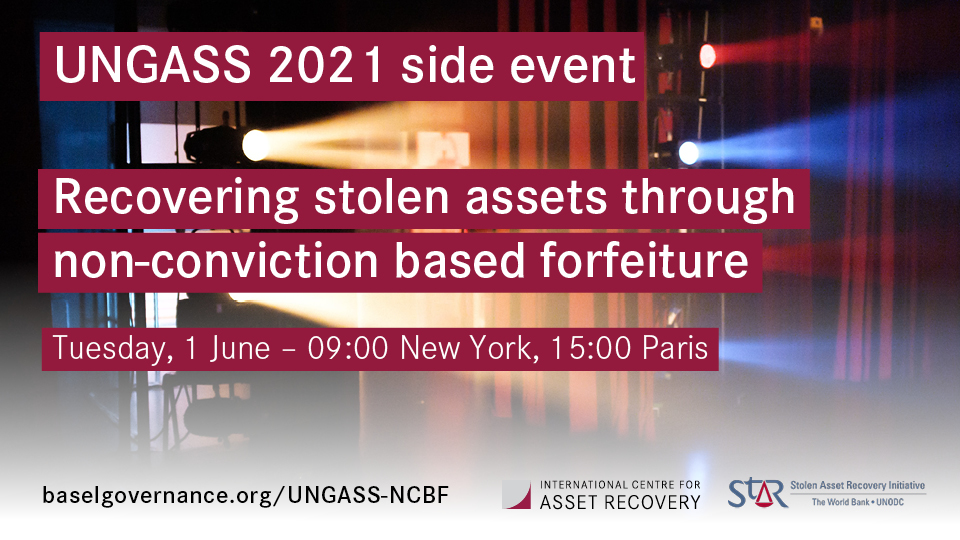UNGASS side event, 1 June – Recovering stolen assets through non-conviction based forfeiture

The UN General Assembly Special Session against Corruption (UNGASS) calls for countries to adopt a wide range of measures to recover assets stolen through corruption.
This includes non-conviction based forfeiture (NCBF), which is emerging as a powerful tool to recover illicit assets when a criminal conviction is not possible.
What can we learn from actual cases of NCBF around the world? What should States consider when introducing NCBF legislation? How can it be applied more effectively and what challenges stand in the way?
These questions are the focus of a side event at the 2021 Special Session of the General Assembly against Corruption (UNGASS) on 1 June, co-hosted by our International Centre for Asset Recovery (ICAR) and the Stolen Asset Recovery Initiative (StAR) of the World Bank and UNODC.
The event takes place virtually in English on Tuesday, 1 June at 09:00 EST / 15:00 CET and is open to all. Register here: Recovering stolen assets through non-conviction based forfeiture.
The panel
Our panel of expert speakers represents both requesting and requested States with experience in applying NCBF to recover stolen assets.
Co-moderators:
- Gretta Fenner, Managing Director, Basel Institute on Governance
- Emile Van Der Does De Willebois, Co-ordinator, StAR Initiative
Panellists:
- Stefan Cassella, Independent asset recovery and money laundering expert
- Patrick Konsbruck, Public Prosecutor, Grand Duchy of Luxembourg
- Oscar Solórzano, Senior Asset Recovery Specialist and Head of Latin America, Basel Institute on Governance
- Nona Tsotsoria, Judge of the European Court of Human Rights
Agenda and background information
The UNGASS side event follows our submission to the UNGASS 2021 Consultation Process last year on NCBF and international cooperation, and a speech by panellist Oscar Solórzano at a preparatory meeting on optimising cooperation in asset recovery. In (very) brief, the issue is this:
Increasingly, States are turning to NCBF mechanisms as a means to recover the proceeds of corruption and other criminal activity. The United Nations Convention against Corruption (UNCAC) recognises NCBF as being a relevant alternative forfeiture mechanism in cases where suspects have died or absconded. States have also successfully used NCBF mechanisms to recover criminal proceeds in other cases where prosecution of an individual may not be possible.
This is a positive development in general. However, as NCBF is increasingly adopted by States, it faces new challenges, in particular where evidence or assets are located in States which have not yet adopted such mechanisms. This restricts the ability of States to fulfil their commitment under UNCAC to “provide the widest measure of mutual legal assistance in investigations, prosecutions and judicial proceedings in relation to offences covered by the Convention”.
The session will explore:
- how NCBF mechanisms have developed as a means of recovering assets stolen through corruption;
- which models exist;
- what issues need to be considered in adapting one of these models to a local context;
- how States have found ways to provide mutual legal assistance in NCBF cases where the requesting State has not yet adopted a similar mechanism;
- challenges to NCBF, including on the grounds of fundamental rights.
The panellists will discuss cases from different jurisdictions where NCBF procedures have been applied, international assistance has been provided and assets have been returned.
More
- Watch the event on YouTube
- Download the event flyer
- Learn more about the StAR Initiative and the International Centre for Asset Recovery
- View the calendar of UNGASS 2021 side events
- The Basel Institute's Collective Action team and Swiss Federal Department of Foreign Affairs are co-hosting another UNGASS side event on 2 June on Collective Action: Building Efficient Public-Private Partnerships. Do join the session for a fresh perspective on the joint fight against corruption.



